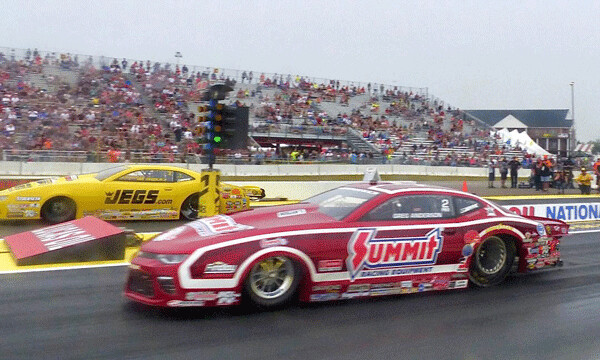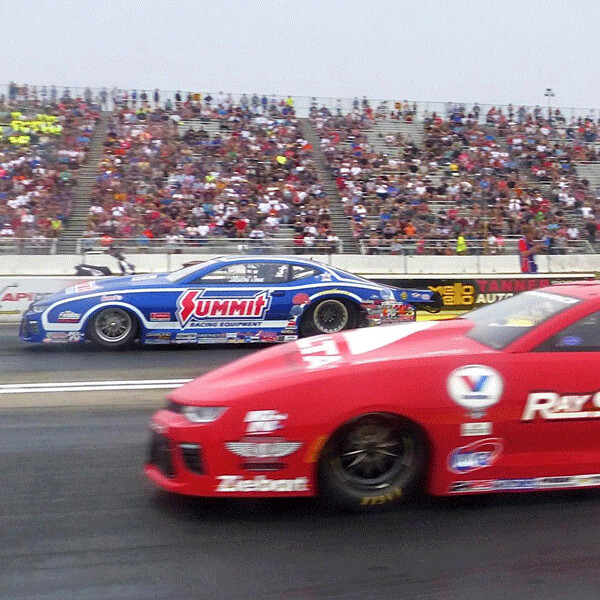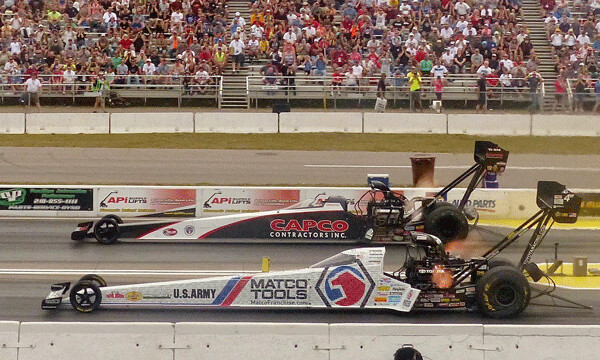News & Articles
Browse all content by date.



We up here in Northern Minnesota can be excused for looking past the National Hot Rod Association’s two premier mind-blowing events — Top Fuel and Funny Car — to focus on Pro Stock, where two of our own command the spotlight.
Greg Anderson of Duluth, and Jason Line, from what you could call a Long Line of drag-racers from Wright, Minnesota, are teammates and are our two standards of excellence, and they put on a great show at the Sunday, August 19 finals of the Lucas Oil NHRA nationals at Brainerd International Raceway.
In fact, they had each knocked off two strong rivals to reach the semifiinals in opposite brackets. Anderson, who leads the season series in points, had beaten Jeg Coughlin in the first round and top weekend Pro Stock qualifier Erica Enders in the second, while Line had beaten Drew skillman in th efirst round and Chris McGaha in the second. That meant if Anderson could beat Tanner Gray in one semifinal, and Line could handle Deric Kramer in the second, we could have had all-Summit Racing final between Anderson and Line.
Didn’t happen. Gray got a large reaction-time edge of 0.038 seconds, and needed it to beat Anderson with a 6.629-second run at 207.02 mph to Anderson’s 6.643-second, 207.40 speed. A 38-thousandths of a second “hole shot” certainly helps a 14-thousandths of a second victory at the far end of the quarter mile.
Line ran a strong 6.673 at 206.83 mph, but it was his slowest of three runs, and either of his first two times would have beaten Kramer, who won at 6.640 seconds and 206.99.
“It’s been a tough year, but we’re getting it back together,” said Line. “At least my little brother won.” That would be Ben Line, who still runs a 1969 Mustang 428 in the Stock category, and knocked off all-comers in the highly competitive Stock bracket to win Stock Eliminator with a 10.538 time over Lyn Shipp’s 10.679.
Anderson, meanwhile, said his points lead could evaporate after losing to Gray. “If Tanner wins the final, he and I will be exactly tied for the season points lead at 462,” said Anderson.
But the luck of the track turned in Anderson’s favor in the final, when Kramer ran a 6.652 at 207.56 mph and Gray cut the starting light too close, and was electronically blocked out with a red-light violation, giving the victory to Kramer and allowing Anderson to keep a slim season points edge. It wasn’t all luck, of course; Kramer buys his engines from the Summit Racing team, so Jason Line, after the great disappointment of losing to Kramer, had to immediately walk over and fine-tune Kramer’s engine for the final. It was undoubtedly the apprehension of going up against Kramer and that engine that spooked Gray into the false start. Kramer’s reaction time was a sensational .002, while Gray’s was also .002, but on the minus side for leaving 2-thousandths of a second before the electronic eye got to .000.
The big guns were still to come, and they certainly did uphold their share of the spotlight. Jack Beckman, who qualified only 14th, ran his best pass of a magical day at 3.961 seconds and 32569 mph, to surprise Tommy Johnson Jr. in the final. Johnson had been top qualifier, but could only manage 4.031 at 319.67.
The Top Fuel finale gave the perfect description of how important the whole package becomes, with not only elapsed time but reaction timing at the start figuring mightily. Billy Torrence, who had never won a national and supports his son Steve Torrence’s powerful team, won his way to the final, where he was opposed by top qualifier Antron Brown.
Brown had the better elapsed time, with a 3.751-second charge to Billy Torrence’s 3.756, which negated the speed edge Torrence had with a 329.99 mph to Brown’s 329.10, but the upset was forged by the slimmest of margins because Torrence had a .037 reaction time to Brown’s .045-second launch. That’s a margin of a mere 8-thousandths of a second. But after calculating all the adjustments for track altitude, 78-degree temperature, humidity, barometric pressure and the track temperature of 100 degrees, Brown had beaten Torrence’s elapsed-time by .007, so that .008 reaction-time edge gave Torrence the victory by 0.001 seconds — 1-thousandth of a second.
| Tweet |


